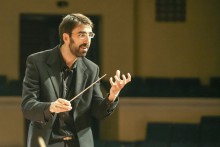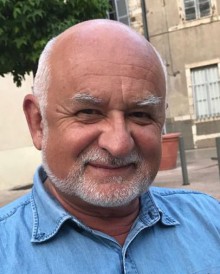Recently the Third International Stefan Turchak Conductor Competition came to a close, and the names of this year’s winners were revealed. They are Mykhailo Vandalovskyi (Ukraine, a diploma), Nazar Yakobenchuk (Ukraine, third prize), Ivan Cherednichenko (Ukraine) and Artun Hoinic (Romania) – second prize, shared, and Gaddiel Dombrowner (France – Israel, first prize).
A juror, Swiss conductor Pawlo DLABOHA shared the details of the competition with The Day.
You are one of the first musicians to have toured in Ukraine after the declaration of Independence.
“Cultural exchange has become my primary mission, and the very Ukrainian consciousness comes first. I wanted to show that Europe is what awaits us. I was trying to help young students obtain scholarships and funds to pay master classes and tuition abroad. Back then, studying abroad was something quite exotic.”
In the early 1990s you conducted orchestras in Zaporizhia, Dnipro, and Lviv. What do you still remember from those tours?
“When performing in Europe, I always address the audience and say a few words. In Ukraine I said hello and told who I was in the Ukrainian language. People were staring at me as if I were an alien from the Moon or Mars. Those were pessimistic times, a somber atmosphere dominated. It was very hard to work. Ukraine was paralyzed by an economic collapse. The public hardly went to concerts. Since we founded the orchestra [Camerata Leonis in Lviv. – Author], I have always been looking for funds to support the band. Once after a rehearsal in Zaporizhia I called the entire woodwinds group to the conductor’s room and presented them with the reeds which I had bought with my own money. The musicians were happy like children. I also used to bring strings with me, because here they were very expensive.”
In 1989 you conducted Heorhii Maiboroda’s Yaroslav the Wise in Washington D.C., which was the opera’s first ever concert performance abroad.
“It was fascinating, in fact, short of a ‘spy story.’ In America my brother met a Ukrainian singer, Regina Babak, who had escaped from the USSR. She told about this opera and suggested performing it to mark the 1,000th anniversary of Christianity in Kyivan Rus’. My brother contacted the Ukrainian mission to the UN in New York and asked them to obtain the score. Three months later one of the diplomats called and arranged to meet my brother at the stairs to the Philadelphia Museum of Art. When my brother turned up there, a man walked up to him, handed in a folder and left without saying a word. Later my brother got a call from FBI who asked about the meeting with the Ukrainian delegate to the UN. Later his house was searched. When my brother opened the folder, he saw the score of Yaroslav the Wise. The sheets were in a terrible shape, all torn up, so we had to restore them. My brother came to my Swiss home and we spent nights gluing the sheets together and filling in the missing notes.
“The opera was staged in Washington, D.C., in the biggest hall. There were three thousand spectators! Later we repeated the performance in Philadelphia and in Toronto. I would love to meet again with the man who handed over the score: at that time, he risked a lot.”
Does the Stefan Turchak competition have an effect on the international reputation of Ukrainian culture?
“All of its international participants have become ambassadors of Ukraine in their home countries. I only got positive feedback from them. The contestants shared about the great welcome they got, and told how the orchestra would help them. It is impossible to imagine a competition in Europe which would be served by an orchestra of such level as the National Symphony Orchestra of Ukraine. I saw that the musicians did their best playing for each candidate.
“I guess it would be possible to create a whole cultural industry if Ukraine hosted European conductor competitions. Here the costs would be two times lower than elsewhere. Instead of holding a competition in Paris, it could be held in Kyiv, Dnipro, or Lviv. There you will find an expert jury, the necessary infrastructure, and a superb orchestra. This could be used to promote Ukrainian culture.”
What criteria should a good conductor meet? Why do conductors performing the same piece make the orchestra sound differently?
“Technique is a must: the left hand is free, the right one is precise. Yet there is something magic and imperceptible. Often a conductor whose technique is not perfect makes the orchestra sound better. It is some phenomenon, and thanks God it exists. Because this is the life in music. This is charisma, when a person radiates. The treatment of orchestra musicians by the conductor is very important. You must perceive them as individuals, and cherish them. They must feel your respect.
“By the way, after the first and second rounds many international participants came up to me to hear my feedback. Even Gaddiel Dombrowner [this year’s winner. – Author] asked me to share my impressions after the final round and the announcement of results.”
How did the competition reveal the differences between the Ukrainian and foreign conducting schools?
“It is very hard to define. In my view, all Ukrainian participants’ technique was just as good. They obviously have a fantastic schooling. Back in my day I would also love to have the same.”
If we can export the format of this competition to Europe, to what extent do our conductors suit the format for European orchestras?
“No doubt that the generation we saw in the competition can easily find a job in Europe. The thing is, who will remain to conduct orchestras in Ukraine? I realize that everyone who can leave, leaves due to the lack of prospects, and it is very sad. Such situation existed in Poland in the 1980s. In Basel I even heard a joke: ‘What is a string quartet? – It is the Basel Symphony Orchestra when all the Poles have left.’”
How important is it for a conductor to be socially and politically conscious and to combine the artistic duty with the moral and ethical one? What do you think of Valery Gergiev’s act [the renowned conductor Gergiev is one of the supporters of Putin’s policy, including the annexation of Crimea. – Author]?
“I believe Gergiev has compromised himself very badly. It was like backing Hitler. It is absolutely disgraceful, the loss of character and conscience. Therefore political consciousness of all Ukrainian artists must come first. Putin uses Russian culture as a propagandist tool and a weapon. Bold-facedly and openly. I saw Gergiev even before the occupation of Crimea, and I did not like what he was doing. He is one of the old school, he conducts Russian classics well, but not European.”
Suppose you get an offer: to conduct a Ukrainian piece (let’s say the Third Symphony by Liatoshynsky) in Moscow…?
“No way! I will never perform there while there is war in the east, and Crimea is occupied! This is like Jewish Holocaust survivors, who prohibited themselves to set foot on German soil. This is an emotional decision, but I insist on it out of principle, even though I am not a Ukrainian national.”
What do you think of those Ukrainian artists who tour in Russia?
“It is a disaster. If it were not for Crimea and the war, it would be okay. But it is a sin to do so after those bloody events. That is why I have no respect for such musicians.”
The Day’s REFERENCE
Pawlo Dlaboha (b. 1951 in Legnica, Poland) is a conductor, teacher, musician, and public activist. Has lived in Switzerland since 1967. Since 1987, has frequently toured in Ukraine (Kyiv, Dnipro, Zaporizhia, Lviv, Odesa). Together with M. Hudzii co-founded the chamber orchestra Camerata Leonis (Lviv), with which he went on a European tour and recorded the CD Camerata Leonis: Lucerne Concert (1999). Juror at the Third International Stefan Turchak Conductor Competition.








